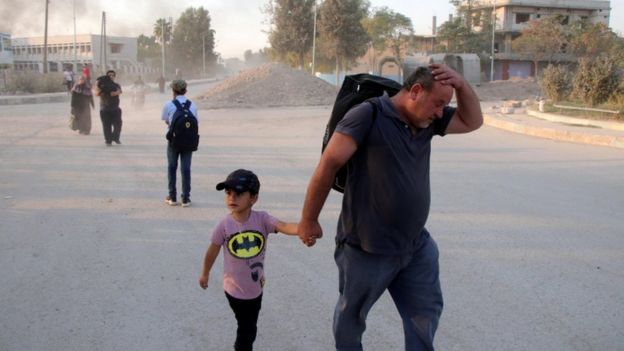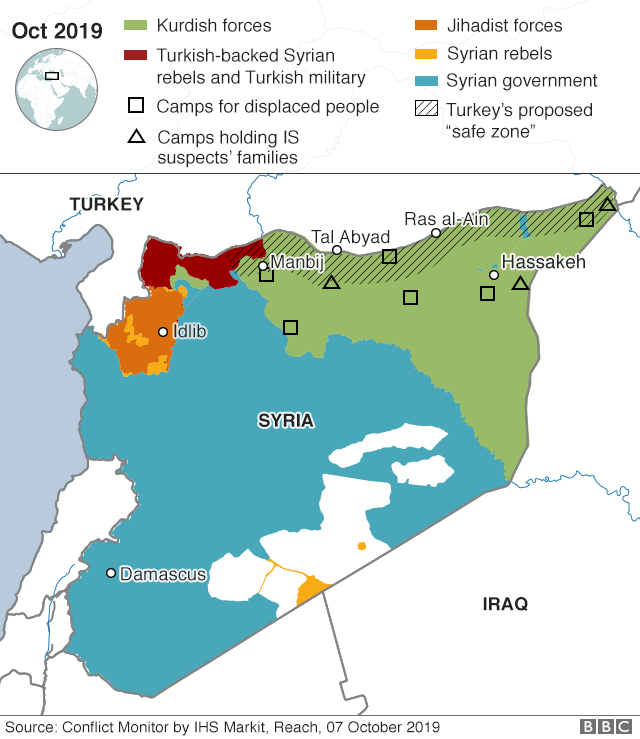Turkey Syria Offensive: Tens of Thousands Flee Homes

Tens of
thousands of people have fled their homes in northern Syria, as Turkish forces
step up their cross-border offensive on Kurdish-held areas.
Turkish
troops have encircled the border towns of Ras al-Ain and Tal Abyad and aid
agencies fear the exodus could reach hundreds of thousands.
International
clamour has increased for Turkey to halt the attack.
Turkey has
defended its bid to create a "safe zone" free of Kurdish militias
which could also house Syrian refugees.
Turkey
regards the Kurdish militias of the Syrian Democratic Forces (SDF) - which have
controlled the cross-border areas - as "terrorists" who support an
anti-Turkish insurgency.
The SDF have
been key allies of the United States in the battle against the Islamic State
(IS) group.
However, it
was after President Donald Trump's decision to pull US troops out of the area
that Turkey launched its assault, sparking SDF accusations they had been
"stabbed in the back".
Many in the
US, including some of Mr Trump's Republican allies, say the withdrawal
effectively gave Turkey a green light.
One major
concern for the international community is the fate of thousands of suspected
IS prisoners, including many foreign nationals, being guarded by Kurdish-led
forces in the region.
The
International Rescue Committee aid organisation said that 64,000 people had
already reportedly fled their homes. The UK-based monitoring group, the Syrian
Observatory for Human Rights, gave a similar figure.
The IRC's
Misty Buswell said: "If the offensive continues it's possible a total of
300,000 people could be displaced to already overstretched camps and towns
still recovering from the fight against IS."
Another
group of 14 humanitarian organisations, including the Mercy Corps, warned the
figure could be 450,000.
Ms Buswell
said IRC teams remained on the ground, although other reports suggest some aid
groups have pulled back across the Turkish border.
Sevinaz, a
resident of Ras al-Ain, told the BBC on Thursday morning: "I am outside
the town with my sick mother. My brother is inside. I have been informed that
my cousin might have been martyred. There is no safe place for anybody.

"I'm
concerned about it being the last time that I see my city."
Rizan
Mohammad, who fled the Kurdish-majority city of Qamishli after Turkish air
strikes, told AFP news agency: "We're heading to the countryside because
we're scared of renewed bombing and intensified clashes."
At the
border you can see columns of smoke rising from the Syrian towns being shelled
by the Turkish military. They look largely deserted but Kurdish fighters
positioned there are firing back.
Several
shells landed close to where many media organisations have set up, including
the BBC on the outskirts of Akcakale. Inside the town, several mortal shells
killed three people, including a nine-month-old Syrian baby.
But in
Turkey there is widespread support for the operation. A tribal chief at the
border hailed it as "a great day for Turkey".
He said it
would mean Syrian refugees could go back home and that he supported everything
President Recep Tayyip Erdogan does. Now that the offensive has started,
Turkey's unlikely to back down.
It's an
often confused picture, with differing versions.
President
Erdogan said 109 militants had been killed, injured or captured in the the
first two days of fighting. The SDF said that figure was an exaggeration but
have not given exact casualty figures.
The Syrian
Observatory said at least 29 SDF fighters had died, along with at least 17
Turkish-backed Syrian rebels from the Free Syrian Army. It also said the
offensive had captured more than 10 villages in the Ras al-Ain and Tal Abyad
area, where the SDF appear to be under severe pressure.
An SDF
Twitter account said an attack by Turkish forces east of the Jalab river had
been repelled, with three military vehicles destroyed and 22 enemy combatants
killed.
The Kurdish
Red Crescent said there had been 11 confirmed civilian deaths so far and 28
serious injuries, mostly in Ras al-Ain and the border town of Qamishli.
At least
five people, including a Syrian baby, were reportedly killed in Kurdish
shelling of Turkish border towns.
Turkey wants
to create a "safe zone" running for 480km along the Syrian side of
the border but says it will not advance deeper than a planned 32km (20-mile)
limit.
The UN
Security Council discussed the situation on Thursday at the request of its
current five EU members - the UK, France, Germany, Belgium and Poland.
The five
called on Turkey to halt its military offensive, saying "renewed armed
hostilities in the north-east will further undermine the stability of the whole
region, exacerbate civilian suffering and provoke further displacements".
UN Secretary
General Antonio Guterres expressed his "deep concern" at the rising
violence.
US
ambassador to the UN Kelly Craft said: "Failure to play by the rules, to
protect vulnerable populations, failure to guarantee that IS cannot exploit
these actions to reconstitute, will have consequences."
That
followed a tweet from Mr Trump in which he said he was "talking to both
sides", adding: "I say hit Turkey very hard financially & with
sanctions if they don't play by the rules! I am watching closely."
Turkey for
its part said it would take responsibility for the IS prisoners it found during
its offensive.
Mr Erdogan
has strongly defended the incursion, threatening to send some of the 3.6
million Syrian refugees it hosts to Europe if the Turkish offensive is
described as an occupation.
FROM .bbc.com/news/world-middle-east-

No comments